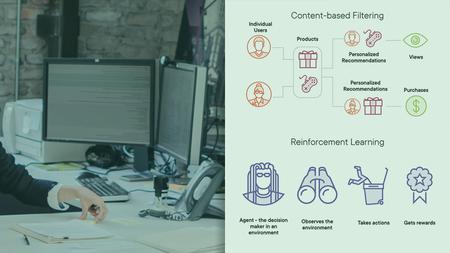
Duration: 2h 6m | Video: .MP4, 1280x720 30 fps | Audio: AAC, 48 kHz, 2ch | Size: 206 MB
Level: Beginner | Genre: eLearning | Language: English
This course will introduce you to the concepts needed to identify use-cases for Machine Learning, formulate an ML problem, enumerate the canonical problems that ML is used to solve, and detail how ML is applied to complex data such as text, images and speech.
Machine Learning algorithms have the ability to adapt and learn from past experiences. Machine learning is important because of its wide range of applications and its incredible ability to adapt and provide solutions to complex problems.
In this course, Key Concepts Machine Learning, you will learn to identify use-cases where ML can provide an appropriate solution, and recognize common structures in ML-based solutions.
First, you will explore the limitations of rule-based approaches and how ML mitigates them. Then, you will discover the different types of ML models such as traditional models and representation models and see how you can develop the ML mindset to find solutions to meet your use case.
Next, you will explore common ML use cases such as regression, classification, clustering, and dimensionality reduction and learn the differences between supervised and unsupervised learning. You will also study specialized use cases such as recommendation systems, association rules learning, and reinforcement learning, as well as learning to apply ML to complex data such as text, images, and speech data.
Finally, you will learn how to formulate your use-case into one of these problem types so that it can then be solved with a commonly used ML-based approach.
When you are finished with this course, you will have the skills and knowledge of the conceptual underpinnings of Machine Learning needed to recognize use-cases for ML, and adopt common ML approaches.
Buy Premium From My Links To Get Resumable Support,Max Speed & Support Me
Links are Interchangeable - No Password - Single Extraction



